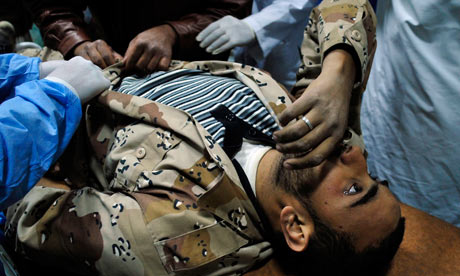No apology from Nato for air strike on Libyan rebel tanks
Deputy commander says fighter pilots didn't know rebels had armoured vehicles in advance of fatal attack near Ajdabiya

A wounded rebel is helped into a hospital in Ajdabiya on Thursday, the day after an attack by Nato jets killed at least five rebel fighters. Photograph: REUTERS
Nato has said it "strongly regrets" the loss of life caused by an attack on Libyan rebel forces in the east of the country in which at least five people were killed, saying it had not been told the rebels had tanks.
The apology came from the Nato secretary-general, Anders Fogh Rasmussen, hours after the British deputy commander of the Libyaoperation refused to say he was sorry.
Rasmussen said: "This is a very unfortunate incident. I strongly regret the loss of life. The situation on the ground is very fluid. We have seen in the past that tanks have been used by the Gaddafi regime to attack civilians."
The attack on Wednesday happened between the towns of Brega and Ajdabiya. Local doctors reported 13 deaths. A similar attack by Nato planes five days earlier killed a reported 10 rebel fighters, and the latest bombing enraged those fighting Muammar Gaddafi's forces.
Earlier, Rear Admiral Russ Harding, the British deputy commander of Nato's Libya operation, said the alliance's jets had carried out 318 sorties and struck 23 targets across Libya in the past 48 hours. "It would appear that two of our strikes yesterday may have resulted in [rebel] deaths," he told reporters in Naples, where the operation is based. "I am not apologising. The situation on the ground was and remains extremely fluid and until yesterday we did not have information that [rebel] forces are using tanks."
The tanks had been seized from Gaddafi's forces and were being used for the first time by the rebels, whose communications with Nato are patchy.
Harding said Nato's mission was to protect civilians from attack and "when you see their tanks coming up, those are the vehicles that can cause the greatest harm to civilians".
Rasmussen, in a clear attempt to correct the impact of Harding's comments, added: "We are conducting operations in Libya in accordance with the UN security council resolution with the aim to protect civilians. This is also the reason why our aircraft target military equipment that could be used to attack civilians, but I can assure you that we do our utmost to avoid civilian casualties."
News of the Nato attack came as wounded rebels were taken to Ajdabiya. A hospital nurse in the town told Reuters that at least five people had died, while the BBC quoted doctors putting the toll at 13.
Rebels outside Ajdabiya were painting vehicles peach colour on Friday to try to make them distinctive from the air.
The MoD is providing 500 satellite phones to help the rebels, who have already been given sophisticated communications equipment by the Foreign Office. Britain is also sending armoured vehicles to eastern Libya to protect the UK delegation to the Transitional National Council, headed by senior diplomat Christopher Prentice.
A rebel reconnaissance party sent from Ajdabiya to Brega came under attack 12 miles from Ajdabiya, suggesting Gaddafi's forces had advanced. Last night Nato hit weapons depots belonging to forces loyal to Gaddafi near Zintan, a resident said. "The depots are situated 15 km southeast of Zintan. We could see buildings on fire in the distance," he told Reuters. "We counted 14 explosions. Rebels believe some of the depots were destroyed, but not all. We are talking about huge facilities."
Earlier, pro-Gaddafi troops pushed into eastern parts of rebel-held Misrata and engaged in street battles with rebels that forced residents to flee. In one skirmish, rebel forces surrounded a group of pro-Gaddafi snipers.
Residents say that they and thousands of migrant workers trapped in the city face shortages of basic foods and have only sporadic supplies of water and electricity. Doctors say the hospitals are overwhelmed.
The International Committee of the Red Cross said it expected a humanitarian vessel it had chartered to reach Misrata by midday today but gave no details of the relief cargo it was carrying.
American journalist James Foley taken prisoner by forces loyal to Gaddafi has been located and is expected to be released in Tripoli, US website GlobalPost reported.
A spokeswoman for Unicef has said snipers were targeting children. Marixie Mercado said the organisation has received "reliable and consistent reports of children being among the people targeted by snipers in Misrata".
TThe US general who led the Libyan mission before Nato took it over has said it was possible that American ground forces could eventually be used in the country.
"I suspect there might be some consideration ([of ground forces)]. My personal view at this point would be that that's probably not the ideal circumstance, again for the regional reaction that having American boots on the ground would entail," General Carter Ham told a Senate Aarmed services committee hearing.
Meanwhile, there were signs that a peace plan proposed by Turkey was gaining traction before an international meeting in Qatar next week.
Recep Tayyip Erdogan, the Turkish prime minister, has proposed that Gaddafi remains in power while a ceasefire is declared in the cities surrounded by forces loyal to him, including Misrata. Humanitarian corridors would be established to allow aid to enter and negotiations leading to a new political process and free elections would begin.
British diplomatic sources have told the Guardian: "There are some good elements in this and next week we will be able to sit down with Turkey and others to talk through all the issues.
"There's a lot in it which seems sensible, although our position is that Gaddafi should go immediately and it seems unlikely that his remaining in power would be acceptable to the Libyan people."
One source conceded that the current state of military action had reached an impasse. "The fighting seems to have coalesced."
No comments:
Post a Comment